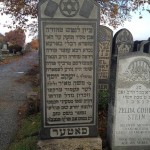Rabbi Yaakov Yosef Stein
יעקב יוסף ב"ר משה מאיר
Rav , Brownsville, NYDate of Death:
Wed. August 6, 1930 -
Av 12 5690
Anyone with biographical information is asked to please send it in.
See CONTACT page for details. Thank you.
Directions to Kever: Mount Judah Cemetery in Queens maintains computerized records and will provide a detailed location map upon request. Location: Society: CHAIM BERLIN, Section: 2, Block: 2, Gate: 12, Path: L09, Grave: 37, Map: 103, Lot: 1 on the corner of Emanuel and Washington Avenue, along the road.
Name Listed on Cemetery Database: Jacob
Biographical Notes:
« Previous: Rabbi Yechezkel MoskowitzNext: Rabbi Shlomo Zalkah Kanarek »




From what I find he was a RY in Yeshivas Reb Chaim Berlin, he wrote a few times in the Torah periodicals of his time.
Why would they leave out his last name.
Do you feel that the word “Even” (stone) is a play on his last name.
Asher,
To omit a the family name of a tumbstone is a custom that has been followed for a long time, where the surname was viewed somewhat medern and not something to present on a tumbstone (the same where Latin characters are prohibitted on tumbstones in the ultra-orthodox sector).
However, for ID purposes it started to become popular all across, this day.
I would not say that the word אבן” Even” is to represent the Stien-Stone theory, as this is a common phrase on tumbstones, based on a biblical verse.
YD Miller:
I notice hat some tombstones have raised letters while others are indented, is it pertaining to custom or just design?
Adam,
I dont know of any custom regarding the inscribing og a tumbstone, but there might be some.
YD Miller
isnt there a gemora that one shouldnt read a matzeva whose osios are “boletes” (sticking out) as opposed to engraved?
When you say reading, does that mean verbalizing the words by mouth or simply looking is also Kosher L’shikcha?
Is there the same issue reading an embossed headstone via photo or only the actual thingie?
I dont remember if there was a distinction between reading aloud or just seeing the words.
It is probably more of a halachic question of whether scanning words with ones eyes constitutes reading. A difference would be studying gemora: does one have to verbalize the words or is just reading the words in your mind enough. Another example would be tefilla, i think one must verbalize there. and simply seeing the words is not enough.
Also, it wasnt really a psak in the gemora, it was in a list of things that causes forgetfulness.
I guess people should ask their rabbis if they think you should be concerned with this tip or not.
1.
a question off topic. The title Father /Fäter and Mother/Müter engraved on all these headstones – isn’t it mostly obvious that a couple is buried her.
Right, in the times when no last names were etched, it’s important to make it clear – but most of the ones i saw do have last names.
2.
i think this was discussed already somewhere on this site, when did we stop putting husband and wife next to each other.
3.
When did we stop writing english on the main headstone?
4.
If Embossed lettering is not a good idea, how do we explain all these embosses Matzevos that we are not allowed to even read?
Asher,
On your # 2 question, while visiting Mt. Zion Cemetary yesterday, you see plots as early as 1900 where husband and wife are not next to each other, while other plots do have families together, I guess it is not a matter of “when” but rather “where”.
Azi:
I was told that “Boltos” is only a problem when the letters are placed on the matzeiva. These matzeivos are engraved around the letters. Still being “inside” the matzeiva. If you (or others) are still worried, say “Ahava Rabba” after reading it.
Asher:
2. Putting Husband/Wife together or not, is a minhag of families or chevras.
3. Writing goyishe oisiyos, When did we start?
@avremele ,
thanks for the clarification. Truthfully i’m not worried since the same gemora says one shouldnt eat small fish (ie sardines) and nobody pays attention to that, so i guess ot was a suggestion only. Im sure the poskim dont quote this gemora.
@avremele , I saw a teshiva by R moshe Shternbuch that only the english date shouldnt be written on a ,matzeiva. he didnt have a problem with the name in english for example.
My great grandfathers name was Joseph Steinkeller, hebrew name Reb Yaakov Tzvi.
His daughter would have been Rivka or Rebecca Steinkeller before marrying into “Stern”
Curious if this is him.